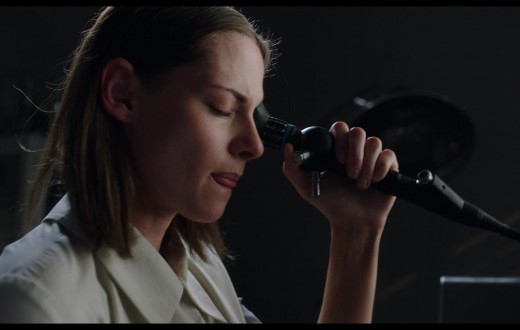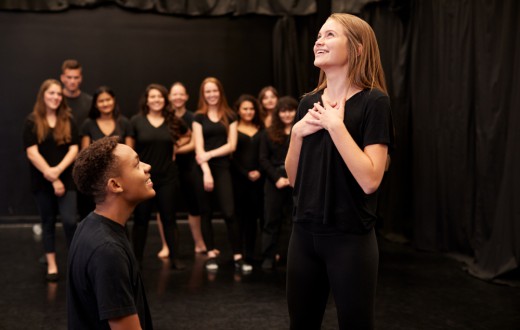If you go out to see theater on a regular basis–and you really should, not only to support theater in general as well as your friends’ shows, but also to contribute to your ongoing education as an actor–you’ve probably seen an improvisation show.
And yes, there is of course some really incredible and well-done improv out there. Amazing talents like Stephen Colbert, Steve Carell and Amy Sedaris along with countless others have a background in improv.
However let’s be brutally honest: there is also some absolutely terrible improv out there. While of course every improv show is going to have hits and misses, even improv lovers would have to admit that there are shows where the ratio of well-thought out and well-performed pieces to the unwatchable, embarrassing pieces skews heavily to the latter.
For some of us, this traumatic exposure to bad improv can turn us off from it altogether, causing us to cringe inwardly anytime a friend invites us to see their oh-so kooky improv group “Salted Nuts” put on a show. But even if we aren’t interested in performing improv, as actors we all owe it to ourselves and our careers to take an improv class. Here’s why:
1. You’re going to need it
Here’s the thing about scripted performance: something will go off the rails at some point. The script should of course be considered by the actor to be a holy document and we should do our utmost to adhere to the wishes of the writer, and to the director, and producer and countless others who approved the script. That said, no matter if you’re performing in theater or on camera, at some point somewhere along the line something is going to come up that is not on the page. Whether it be a forgotten line, a missed entrance, or a huge crashing sound coming from backstage, at some point you are going to be called upon to improvise a reaction that is unrehearsed. And like anything, the more practice you have doing so, the easier it becomes. Not only that, many auditions these days, especially for comedic pieces, call for the actor to do a little bit of improv as part of the process. Imagine how much more comfortable you’ll be when this comes up having taken an improv class or trained with an improv group!
2. Improv builds confidence
Related to the above point, the more you do improv, the more confident you become as an actor. After all, if you’ve been out in front of a class or on stage performing a piece based on random audience suggestions, you are bound to be more confident about rolling with the punches when something random and unexpected comes up in a scripted performance. Seasoned improv actors have endured multiple baptisms by fire that render them nigh-impervious to freezing up like a deer in the headlights when something comes at them like this. Not only that, this confidence in your ability to react to whatever comes along translates directly to real-life situations too. It can be invaluable to your networking and ability to connect to other people, both in the field and outside it.
3. Sharpens your wits
Like any tool, the brain grows dull and rusty with lack of use. To continue with the metaphor, people who do improv on a regular basis are among the sharpest knives in the drawer, simply because they have to continually and consistently access those parts of the mind that allow them to respond on the fly. “Yes, and…” is the well-known rule of improv–agree and add something to whatever has been said–and you need to have your wits about you in order to be able to do this effectively. You have to mentally move quickly in improv, and learning how to do this better will lend itself to those moments on stage or in front of the camera when the unexpected occurs.
4. Being present
We talk a lot bout being present in acting, and there’s nothing like improv for making you really focus on the here and now. When you’re performing improv, you can’t check out for half a page while another actor chews the scenery in the same tired monologue you hear them recite night after night. You must constantly be listening, watching, aware and awake to whatever might transpire, because you have no idea what that might be! Honing these skills in improv can really amp up your ability to be present in scripted performances too. Also, by making ourselves accessible to whatever comes along as one must do in improv, we sharpen our actor’s toolkit in another way. The answer “yes, and” requires openness, and as actors the ability to accept and move forward with whatever is happening around us is invaluable, lending a whole other level of depth to our ability to be present.
5. Making strong choices
We’ve all heard numerous and conflicting statements along the lines of “acting is all about x.” But among the many things “they say” acting is, it is undeniable that our acting hinges on choices. And there’s nothing like improv for driving you to make quick, strong choices–excellent training for auditioning when you will often be called upon to perform material you are unfamiliar with. Indeed, how many times have you heard a casting director or other member of a casting team ask you to “try it again, but give us something different this time.” Many less-experienced actors might react with something like, “Uhhhh…shit.” Conversely, the seasoned improv actor’s first thought will be–say it with me now: “Yes, and!” What’s more, growing more comfortable with the heightened risks inherent to performing improv engenders within us more comfort with making riskier choice in our auditions and performances. Try to imagine yourself as a casting director and think about what it would be like to see 50 or 100 actors all reading for the same part over the course of a day or two. How many of those actors–working completely legitimately by letting the text inform them–are bound to make the same or similar choices in approaching the character? The improv actor’s ability to think way out of the box also gives him or her a leg up when it comes to preparing scripted characters.
You don’t have to join or form a group named something like Salted Nuts or Cerebral Ballsy in order to benefit from improv. Look for a class, or just get together with some actor friends at home or even during your down time at the theater and look up a few improv games. There are certainly worse ways to use your time–and next time something goes wonky you’ll thank me!







